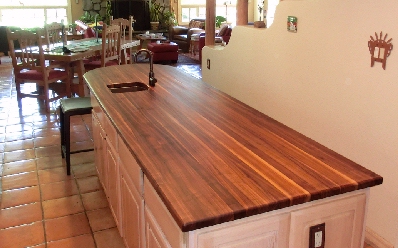Butcher block countertops.
Wood countertops |
DISADVANTAGES
- Wide board butcher block countertops can warp, although chances of this happening are slim and almost nil for narrow strip counters.
- Prone to water and stain damage, burns easily and absorbs odors. |
HEALTH CONCERNS
-The U.S. Food & Drug Administration (FDA) advises that cutting boards and countertops be washed with hot soapy water after preparing food items on them. It also recommends periodically sanitizing these surfaces using a bleach solution. However you're best advised to check with the manufacturer of the countertop for their recommended cleaning methods before using any particular cleaning solutions. |
TIP
Don't use vegetable or olive oils to treat wood, as they can turn rancid; use only food-grade mineral oil. |
|
| Wood (Butcher Block) Countertops |
|
|
Butcher block countertops. Wood countertops
Butcher block countertops and tables will give a natural warm appearance to most kitchens. I think that one of the reasons for its rising popularity is that in some way the butcher block countertop reminds us to the good old times when it seemed that most of the family life took place in the kitchen. Butcher block countertops are warmer to the touch than stone and offer a richer look than laminated counters. Wood countertops are narrow strips (length edge grain) or wide planks (flat-grain) glued together. Cross grain edge are more for real butcher blocks, click here for image. The standard thickness for butcher block countertops is 1 1/2" (38 mm).
It's original design is from the massive square butcher's block that was commonly used in butcher's shops and meat processing plants.
Modern butcher block countertops and tables have improved greatly over the years and are now a popular alternative to other material.
MATERIAL - LIFESPAN
Wood countertops are mostly made of maple, beach, walnut and cherry.
Note about teak. Some sources mention that countertops are also made of teak. From my own experiences in handling teak and lessons learned at the Wood Academy I attended I don't think that that is such a good idea. Teak is very oily and stands up well to water but once the oil is depleted from near the surface, water can make ugly stains which are hard to remove. Teak also contains silica which will dull knives and lastly, it is very expensive.
Manufacturers of wood countertops claim that their products have a useful lifespan, compatible to natural or man-made stone materials. |

The beautify and warmth of wood. Full length edge grain countertop. |
|
MAINTENANCE
Always prepare food on a cutting board and always immediately wipe up any spillage.
Cleaning.
Wipe with a damp cloth and mild dish washing liquid. Rinse well with a clean, damp cloth. A cloth dampened with fresh lemon juice or white vinegar may remove or lighten stains, and deodorize a surface finished with mineral oil.
Periodic maintenance.
To maintain the health and good looks of your butcher block countertop you can apply a food-grade (non toxic) oil or a natural oil.
- Food-grade oil applications: Once a month, or when oiled countertops begin to look dry, reapply oil. Place a bottle of food-grade (nontoxic) mineral oil into a bowl of hot (not boiling) water, then rub a generous amount of oil onto the surface with a soft, clean cloth, working with the grain; reapply after the wood soaks up the oil. Continue until the wood stops absorbing oil. Wipe off excess oil, then let the countertops dry for at least six hours or, ideally, overnight, before using.
- Natural oil applications: For butcher's block countertops treated with a natural oil finish, it is recommended that you re-oil every four to six weeks. You can use a pure white mineral oil that you purchase at a local hardware store or grocery store. The mineral oil helps preserve the wood and also (along with good cleaning practices) helps protect it from harboring bacteria.
NOTE: Mineral oil prevents the wood from warping and drying out, but will not prevent stains.
TIP: Don't use vegetable or olive oils to treat wood, as they can turn rancid; use only food-grade mineral oil.
Butcher block countertops which will not be used for cutting and preparing food should have a polyurethane or other non-permeable finish to protect the wood countertop from water damage. Polyurethane provides an impenetrable plastic like coating.
Scratches.
Scratches can be removed by sanding with the grain. Use a fine-grit sandpaper (grade 220 to remove stains and 400 to smooth). The worked-on area will have to be re-oiled with mineral oil or resealed with polyurethane. |
|
|
|
|
Back to Top |
|